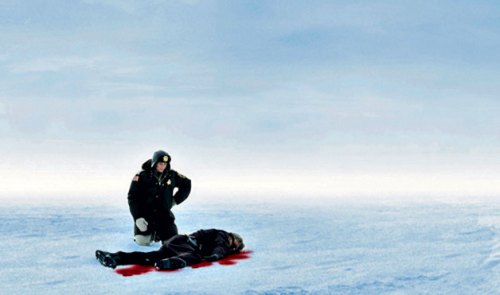Fargo (Joel & Ethan Coen, 1996)

William H. Macy (Jerry Lundegaard), Frances McDormand (Marge Gunderson), Steve Buscemi (Carl Showalter), Peter Stormare (Gaear Grimsrud). Screenplay by Joel & Ethan Coen. Directed by Joel Coen. Rating: 18. Running time: 98 minutes.
There is no film quite like Fargo. This tale from the Coen brothers, or perhaps it should be called a heap of mishaps, is as visually distinctive as their work gets, and is probably as close as they’ll ever make it to perfection. The more you think about it, the more you realise what a bizarre film it is to love so much. But love it we do. From its winter journeys through the snow-laden north of America, to its heavily accented and magnificently odd characters, this calamitous bloodbath of a movie is as deceiving about its claims to truth as it is devilishly amusing. The greasy Dude Lebowski chilling in his dressing gown and occasionally bowling and the petrifying Anton Chigurh rampaging across the desolate south of Texas are two pretty incredible images that any moviegoer will do well to forget. But when put aside memories of Steve Buscemi driving through snowstorms, occasionally stopping with his gormless co-kidnapper Gaear Grimsrud to eat pancakes and get laid in cosy but shabby Minneapolis motels, not to even mention the character of Marge Gunderson, designed so evidently but amazingly for Frances McDormand that it’s almost untrue, Fargo is the film that rises from the Coen brothers’ oeuvre as their magnum opus that puts them beyond mere mortals. Marge Gunderson is the sharp but heavily-pregnant cop put onto the case as it evolves – she’s called out to the highway shootings and ultimately works her way back to Jerry, the son-in-law who has his wife kidnapped by a couple of a goons in a foolish attempt to extract ransom money from her father to fund his new business venture. The phrase she’ll have ingrained into your memory by the end of the film is ‘oh yah.’ It’s hurled back and forward and exhibited so obviously as part of the regional dialect here that it becomes a trademark of Fargo exchanges. It’s interspersed, of course, with a batch of mindless murders and a healthy hand of shrewd cop-work, but the substance is always nothing more than a platform of secondary importance upon which to plant an incredible style. That style gives us everything we could possibly need to remember Fargo for. If Martians wanted to know what this strange human creation called film was, they would probably be best off starting here.
Filed under: america, comedy, crime | Leave a Comment
Tags: anton chigurh, ethan coen, fargo, frances mcdormand, gaer grimsrud, jerry lundegaard, joel coen, marge gunderson, mineappolis, motels, no country for old men, snow, steve buscemi, the big lebowski, the coen brothers, the dude, william macy
No Responses Yet to “Fargo (Joel & Ethan Coen, 1996)”